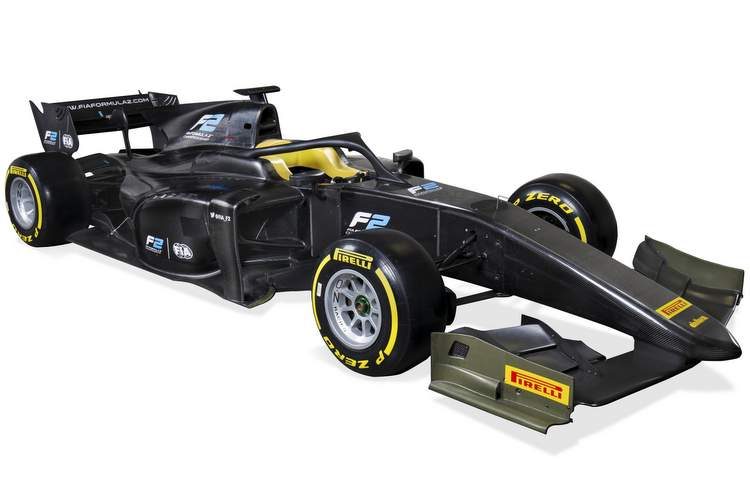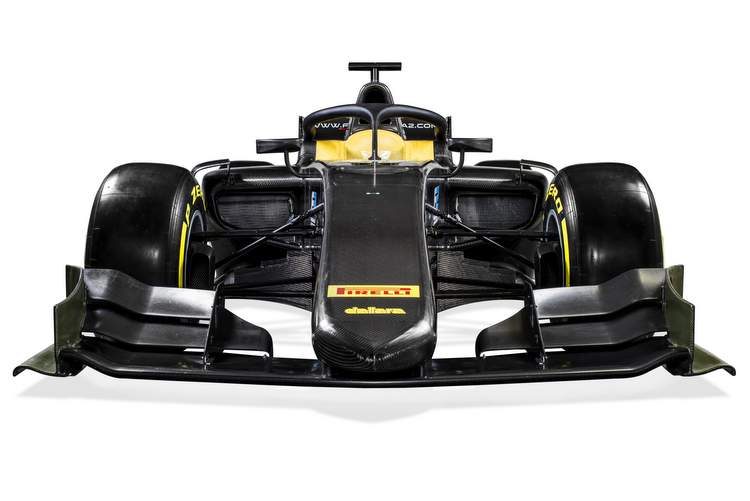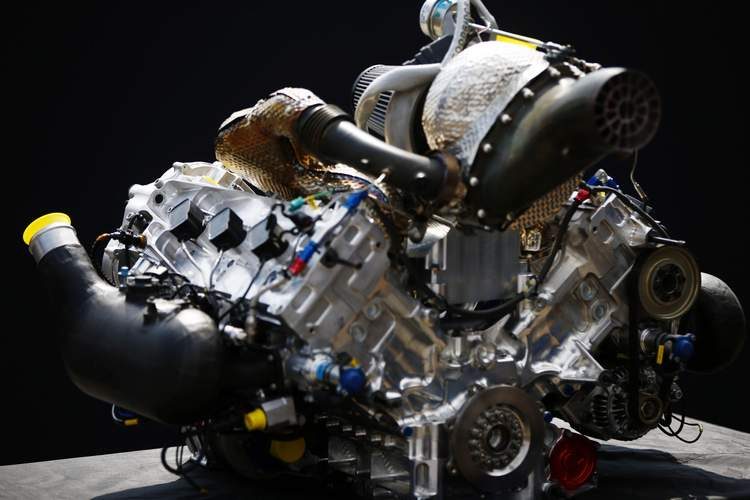Bahrain opener marks debut of new generation F2 car
 |
| Given the power to weight ratio, by all accounts the new F2 car will smoke an IndyCar |
The FIA Formula 2 Championship will this year mark the debut of the next generation F2 car which will serve the Formula 1 feeder series until the end of 2020.
The new car, which complies with the latest F1 safety standards, features architecture typical of a modern F1 car and a 3.4 liter turbo-charged Mecachrome engine, which delivers 620 HP at 8,750 rpm. The design philosophy was to refresh the car to mirror the latest updates in F1 design, and to maintain a long tradition of wheel-to-wheel racing.
The safety updates include changes to marshalling such as the Virtual Safety Car (VSC), Drag Reduction System (DRS) and upgraded electronics, and most notably is the first new car to be revealed featuring the Halo system, which was incorporated at the final stage of the design process.
The electronics have been enhanced with an updated ECU, which features expanded evolution possibilities for later years in an effort to future-proof these components, a design decision which is in line with the usual focus on cost control. The operational costs for the teams are expected to be similar to this year.
The car has made a successful shakedown in July at the Circuit de Nevers Magny-Cours, and the development program will continue over a number of tests across the remainder of the year to accumulate sufficient mileage, to ensure that a functional and reliable car will be delivered to the teams.
Two test sessions in December will be solely focused on performance testing, where the car will be pushed to its limits ahead of the handover process to the teams. A first car will be delivered to the teams in mid-January 2018, and the second car will be delivered in mid-February. There will be a shakedown with the teams between these dates to allow them to become acclimatized with the car ahead of the first official pre-season test.
 |
| Front View |
Pirelli is once again the official tire supplier to the championship and has been integral to the design process to ensure continuity with respect to the tires.
Charlie Whiting, FIA Director of F1 and Director, Single-Seater Department commented: “The plan for a more structured junior formula ladder is designed to feature cars that better prepare drivers for the next step. For Formula 2, that means we needed a car that will not only educate but will also allow the drivers that are most ready for Formula One to shine brightest.
“The car has been developed to include improved aesthetics, as well as bringing the safety level up to the highest standards for single-seater cars – and to ultimately bring it closer to a modern Formula One car on both of these points."
FIA Formula 2 Championship CEO Bruno Michel said: “Our focus has always been on providing a powerful, safe and challenging car which will encourage overtaking, and thanks to the new aerodynamics package we believe this car will both enhance racing and provide even more entertainment for our fans. Our philosophy has always been to match this with cost control for the teams, and we believe the F2 2018 will continue to limit operational costs and provide an attractive package to our teams.
“Finally, and most importantly, the F2 2018 matches the very latest F1 safety standards: we have a strong track record on safety, and this was a principle focus during the design process. I believe that the F2 2018 is the right car for the next stage of our championship, while also providing a worthy race car for the final step of the motorsport ladder for our drivers hoping to achieve their ultimate ambition: a race seat in F1."
The F2 2018 car specs
Dimensions
- Overall length: 5224 mm (was 5065mm)
- Overall width: 1900 mm (unchanged)
- Overall height: 1097 mm including FOM roll hoop camera (was 1072 mm)
- Wheelbase: 3135 mm (was 3120mm)
- Overall weight: 720 kg (driver on-board)
 |
| 620 HP engine |
Engine
- V6 3.4 liter single turbo charged Mecachrome engine
- Rated to 620 HP @ 8750 rpm
- Fly by wire accelerator system
- Rebuild after 8000 km
- Maximum Torque 600 Nm
Performances
- Acceleration: 0 – 100 km/h, 2.90 sec
- Acceleration: 0 – 200 km/h, 6.60 sec
- Maximum speed: 335 km/h (Monza aero + DRS)
- Max. braking deceleration -3.5 G
- Max. lateral acceleration +/- 3.9 G
Safety standards
- Full FIA F1 2017 safety standards
- Halo F1 specification
- Monocoque and Bodywork
- Survival cell – Sandwich Carbon/aluminum honeycomb structure made by Dallara
- Front and rear wing – Carbon structures made by Dallara
- Bodywork – Carbon – Kevlar honeycomb structures made by Dallara
DRS
- Same functionality of DRS used in Formula One
- Hydraulic activation
Gearbox
- 6-speed longitudinal Hewland sequential gearbox
- Electro-hydraulic command via paddle shift from steering wheel
- ZF SACHS Carbon clutch
- No on-board starter, anti-stall system
- Non hydraulic ramp differential
Fuel cell
- FIA Standard
- Premier FT5 125 liters
Electronic features
- Magneti Marelli SRG 480 ECU/GCU including data logging system
- Magneti Marelli PDU 12-42 power supply management unit
- CAN data acquisition pre-equipment
- Beacon receiver
Suspension
- Double steel wishbones, pushrod operated, twin dampers and torsion bars suspension (F) and spring suspension (R)
- Adjustable ride height, camber and toe
- Two way (F) / Four way (R) adjustable Koni dampers
- Adjustable anti-roll bar (Front/Rear)
Brakes
- 6 pistons monobloc Brembo calipers
- TBC carbon-carbon brake discs and pads
Wheels and tires
- F1 2016 standard wheel dimensions
- O.Z. Racing
- Magnesium rims
- 13" x 12" front F1 2016 standard wheel dimensions
- 13" x 13.7" rear F1 2016 standard wheel dimensions
- F2 specific Pirelli slick / wet tires
Steering system
- Non-assisted rack and pinion steering system
- XAP steering wheel with dashboard, gear change and clutch paddles, marshalling & VSC display
Camera equipment
- Roll hoop, nose cone and face shot camera pre-equipment.
